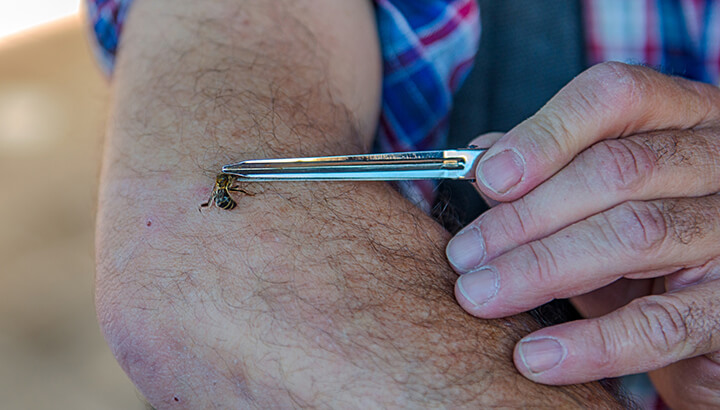An article about bee sting therapy caught my eye this week. Tragically, a woman recently died in Spain after undergoing a bizarre form of therapy at a clinic that involved bee venom. The therapy is known as apitherapy, which involved the woman attending a session every four weeks for two years, which was designed to improve her muscular control without allergic reactions.
As a child, and as unlikely as it now seems, I remember attempting handstands on the lawn of our garden. Unfortunately, during this challenging activity, I placed my hand over a bee who was sunning himself quietly in the grass. The bee quickly let it be known that he was not happy with my gymnastic efforts. I remember that the resulting sting was very painful and that my mother quickly removed the sting once she had realised what all the fuss was about. I also recall taking great consolation after I was told that a bee can only sting once, and then it dies.
Several weeks later, I remember my father coming home from work, telling us that the young wife of a good friend and colleague had died from a bee sting that very morning. I remember my parents being very upset about this tragedy, and after my event a few weeks earlier, I considered myself to be extremely fortunate, given the circumstances.
Since that time, I have always treated bees with the utmost respect and until recently have had a somewhat cynical view of how bee stings can actually help to preserve and enhance life; I am now having some doubts.
Bee Sting Therapy claims to bring relief and healing for spinal, neural, joint and musculoskeletal conditions that includes gout, arthritis, tendinitis, shingles, Parkinson’s Disease, Alzheimer’s, cancerous tumours, fibromyalgia, cramps, pulled muscles and many other ailments. The therapy is based upon the idea that bee venom stimulates the adrenal glands after a sting, which produces the hormone, cortisol, which has anti-inflammatory properties that jump starts the healing process.
This is not as unlikely as it sounds, since it has been reported for some time that venom from bees, as well as snakes, spiders, scorpions and sea urchins have the potential to work as the next generation of drugs that have the ability to effectively fight cancer. Needless to say, pharmaceutical companies are currently working hard to exploit the potential of these natural remedies to enhance their balance sheets and to impress their shareholders. The theory is impressive and I hope that current research bears positive results that will improve the lives of so many people suffering from a range of debilitating and life-threatening conditions.
This particular therapy involves holding a bee by its head and pinching it until the bee’s stinger emerges and punctures the patient’s skin. Sadly, the poor bee always dies in the process, since they can only use their sting once. In the case of the patient in Spain; she suffered an anaphylactic shock, developed wheezing and lost consciousness. An ambulance was called, a steroid was administered, but no adrenaline was made available. The bee sting had triggered a stroke, the patient fell into a permanent coma, and sadly died a few weeks later from multi organ failure.
Advocates of apitherapy make many claims for its health benefits, which remain largely unsupported by traditional medicine, but such cynicism has been faced by advocates of chiropractic, acupuncture and aromatherapy, amongst other therapies. Indeed, some therapies, previously regarded as ‘fringe’ by the established medical profession, have gained a reputation as effective therapies in recent years and are often used to support traditional medicine. This sad incident in Spain is reportedly the first case of death by bee venom.
I will continue to do my best to keep an open mind about this and other therapies, but at the moment would prefer that my only contact with bees is through honey on my morning toast.
If you enjoyed this article, take a look at my websites: http://barriemahoney.com and http://thecanaryislander.com or read my latest book, ‘Living in Spain and the Canary Islands’ (ISBN: 9780995602724). Available in paperback, as well as Kindle editions.
Join me on Facebook: @barrie.mahoney
© Barrie Mahoney





